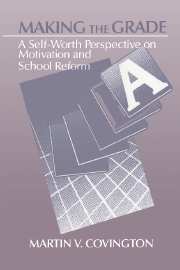Book contents
- Frontmatter
- Contents
- 1 The future and its discontents
- 2 Motives as emotions
- 3 Motives as thoughts
- 4 Self-worth and the fear of failure
- 5 Achievement anxiety
- 6 The competitive learning game
- 7 Motivational equity and the will to learn
- 8 Strategic thinking and the will to learn
- 9 An immodest proposal
- 10 Obstacles to change: The myths of competition
- Appendix A Mastery learning
- Appendix B Cooperative learning
- References
- Indexes
Appendix A - Mastery learning
Published online by Cambridge University Press: 05 June 2012
- Frontmatter
- Contents
- 1 The future and its discontents
- 2 Motives as emotions
- 3 Motives as thoughts
- 4 Self-worth and the fear of failure
- 5 Achievement anxiety
- 6 The competitive learning game
- 7 Motivational equity and the will to learn
- 8 Strategic thinking and the will to learn
- 9 An immodest proposal
- 10 Obstacles to change: The myths of competition
- Appendix A Mastery learning
- Appendix B Cooperative learning
- References
- Indexes
Summary
John: The failure avoider revisited
John stands on the threshold of his next ordeal: the introductory psychology course. Recall that repeated academic failure has eroded John's faith in himself and in his ability to succeed in college. Fortunately for John, however, the rules of the learning game are about to change for the better, thanks to mastery learning. What, more precisely, is mastery learning?
Mastery learning comes in many forms. We have already described Mr. Rodriguez's use of contingency contracting as well as his elaboration on the simplest, most frequently employed type of mastery learning: the so-called Kellar Plan, named after Fred Kellar, a pioneer advocate of mastery learning. In this instance, Mr. Rodriguez established objectives for all Global Gambit teams that involved learning various facts about their respective countries. Then he developed a brief test for each team with questions that closely fit the preannounced objectives, meaning that the test was “criterion referenced.” Mr. Rodriguez also set a passing score that represented a minimally acceptable performance. Those students who failed to pass the test initially could study more and then be retested.
The mastery philosophy assumes that most students can eventually assimilate the basic lessons taught in school if (1) these learning objectives are couched in clear, absolute terms, and (2) students are given sufficient opportunity to do so through repeated study, timely feedback, and adequate guidance. Unfortunately, some early advocates oversold the benefits of mastery instruction by contending that, for example, “it strives to make students more alike – by making them all excellent” (Born & Zlutnick, 1972, p. 30).
- Type
- Chapter
- Information
- Making the GradeA Self-Worth Perspective on Motivation and School Reform, pp. 269 - 275Publisher: Cambridge University PressPrint publication year: 1992



